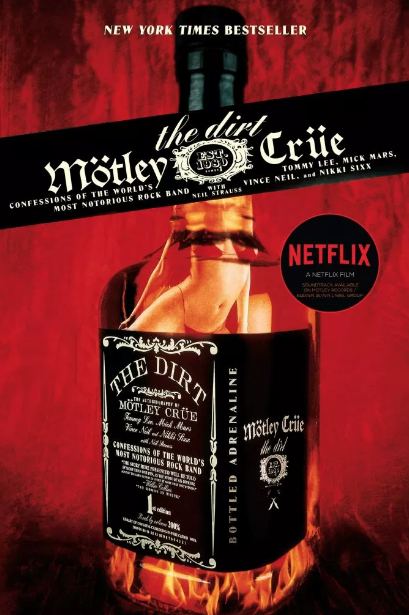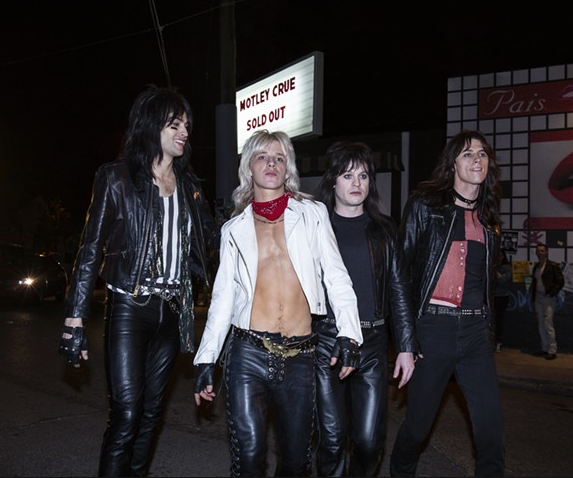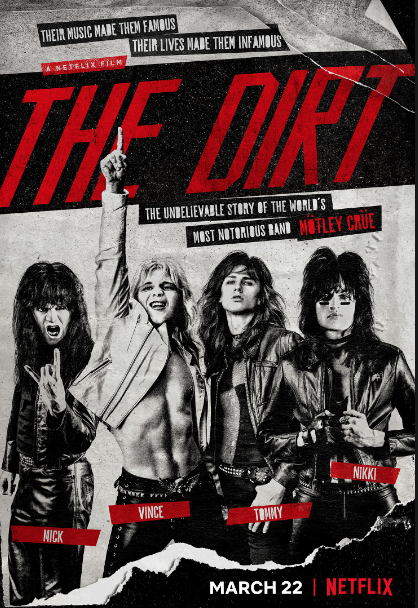Whether you love it or hate it—or maybe you just call it a “guilty pleasure”—the Mötley Crüe biopic “The Dirt” is generating its share of buzz. The Netflix pic debuted on March 22nd to mixed reviews. Critics have been lukewarm, while fans have been unabashed in their praise of it (user rating is about 85% on Rotten Tomatoes; Google users rate it “thumbs up” at 95%).
 Of course, “The Dirt” movie is based upon the book of the same name, written by Neil Strauss in conjunction with each member of the band—vocalist Vince Neil, bassist and songwriter Nikki Sixx, guitarist Mick Mars and drummer Tommy Lee. The book was published back in 2001, and talk of a movie version of the book began not long after. After several false starts along the way, Netflix picked up the rights and, as they say, the rest is history.
Of course, “The Dirt” movie is based upon the book of the same name, written by Neil Strauss in conjunction with each member of the band—vocalist Vince Neil, bassist and songwriter Nikki Sixx, guitarist Mick Mars and drummer Tommy Lee. The book was published back in 2001, and talk of a movie version of the book began not long after. After several false starts along the way, Netflix picked up the rights and, as they say, the rest is history.
As someone who’s been a professional music critic and a long-time fan of Mötley Crüe, I guess it’s appropriate that my review lies somewhere in the middle. Did I like it? Yes. It stays fairly accurate to the book, though the timelines are a bit off in parts.
If ‘The Dirt’ falls short of the mark, it’s because of director Jeff Tremaine, who took a wealth of great material and, in key moments, botched it.
Is it a “great” movie? No, not quite. I don’t place the blame, however, on the shoulders of the main actors—Machine Gun Kelly (Tommy Lee), Douglas Booth (Nikki Sixx), Daniel Webber (Vince Neil) and Iwan Rheon (Mick Mars)—each of whom did more than a solid job in their roles (though Mick Mars never spoke as often as his character in the movie does). Even Pete Davidson’s disastrously bad performance as Electra Records rep Tom Zutaut wasn’t bad enough to bring the movie down. If “The Dirt” falls short of the mark, it’s because of director Jeff Tremaine, who took a wealth of great material and, in key moments, botched it.

The Mötley Crüe story is dark and gritty; they had to scratch and claw to make it out of the very competitive “Sunset Strip” scene of the early ‘80s to eventually become rock stars. People died—most notably, Vince’s daughter Skylar, who died of cancer at age four; Nicholas Dingley, aka “Razzle” of Hanoi Rocks, who died following a car crash where Vince was driving drunk and ended up in jail because of it; and Nikki, who died of a heroin overdose only to use again the very night he OD’d! There was also a wealth of family issues and the drama of divorces, most notably the “divorce” of Vince from Mötley until his eventual return.
Still, even with all of this real-life drama, Tremaine managed to keep the tone relatively light throughout, removing any of the grit and grime from the actual story and putting a light-hearted shine on the movie as he shifted quickly (and often clumsily) from scene to scene to scene. The best example of this tone-deaf approach was the climactic scene where Nikki overdoses. It was practically played for laughs, as the guy who brought him back to life by hitting him in the heart with two separate adrenaline shots high-fives his co-worker in the ambulance as Nikki says “ouch” upon coming back to life. Really? A high-five? “Ouch”? Ugh.

And for a movie about a band, there was a disturbing lack of attention paid to Mötley Crüe’s music in “The Dirt.” The movie spent precious little time discussing songs or albums, even such career-defining tracks as “Home Sweet Home,” “Kickstart My Heart” or “Girls, Girls, Girls.” Even the success of their chart-topping album “Dr. Feelgood” was breezed over as if it was a meaningless blip on their career’s radar (if anything, their lengthy Feelgood tour was seen as a pain-in-the-ass inconvenience that led to Vince quitting the band or being fired, depending on whose version of the story you believe).
The best example of this tone-deaf approach was the climactic scene where Nikki overdoses. It was practically played for laughs, as the guy who brought him back to life by hitting him in the heart with two separate adrenaline shots high-fives his co-worker in the ambulance as Nikki says “ouch” upon coming back to life. Really? A high-five? “Ouch”? Ugh.
But speaking of those “Girls, Girls, Girls” … there were plenty of them in “The Dirt” and plenty of sex as well (how about that squirting scene, and on Netflix no less!), and the boys’ love of strip clubs was certainly not overlooked. In fact, Mötley Crüe’s connection to the club industry is well documented, both in the movie and the book. It’s this connection that led to Mötley Crüe’s induction into our (ED Publications’) Hall of Fame back in 2007 (Vince Neil was on hand to accept), mainly for writing what has long been considered the most well-known track in the history of the strip club industry, “Girl, Girls, Girls.”
Whether or not you enjoy “The Dirt” will depend on your expectations. If you’re expecting a Martin-Scorsese-style treatment or even a film worthy of the praise that’s been bestowed upon the Queen biopic “Bohemian Rhapsody,” you’ll be disappointed. “The Dirt” isn’t going to get any Academy Award nominations anytime soon. But if it’s their connection to the industry that sparks your curiosity, the fact that the movie is full of sex, drugs and rock ’n’ roll, or that you’re a longtime “Crüe Head,” “The Dirt” will definitely entertain you.






























